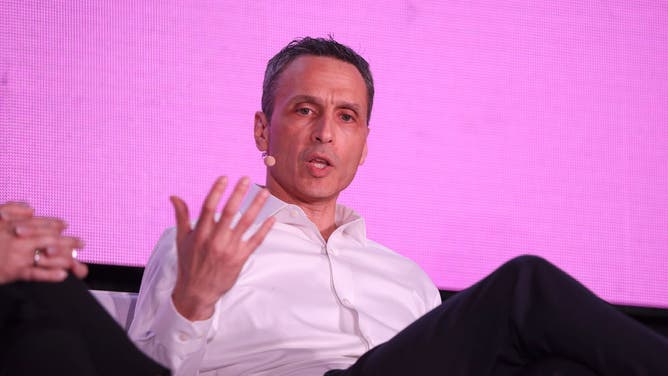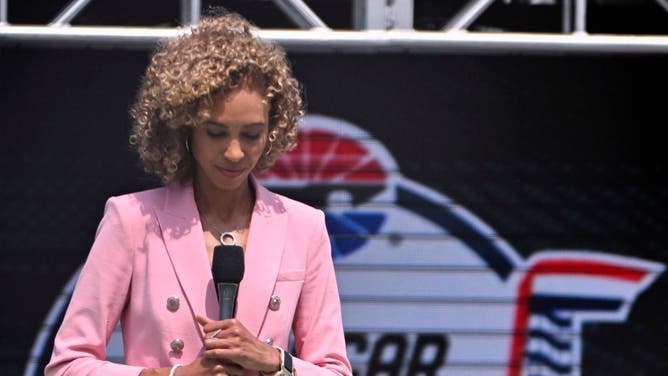ESPN President Jimmy Pitaro Has Made ESPN Political Again | Bobby Burack
In 2018, recently appointed ESPN president Jimmy Pitaro told a sea of reporters during an on-campus media day that ESPN is "not a political organization."
Pitaro's initial approach to discussing politics differs considerably from his predecessor, John Skipper, who enabled certain personalities to express political positions.
Near the end of Skipper's reign, during the same year, a Langer Research Associates poll found that 63% of viewers associated ESPN with a "liberal bias."
Pitaro sought to shed that perception by returning ESPN to a place welcoming to all fans of professional and collegiate sports.
"We are a sports media company," he said with defiance.
Pitaro, to his credit, cleaned up the hallways at ESPN. The company de-emphasized social commentary from Bomani Jones, Dan Le Batard and Katie Nolan early in his tenure. ESPN prioritized sports reporting from the likes of Adam Schefter, Adrian Wojnarowski and Jeff Passan.
But then came 2020 and the death of George Floyd. Pitaro's tone shifted dramatically.

NEWPORT BEACH, CALIFORNIA - OCTOBER 22: ESPN President Jimmy Pitaro speaks at the espnW Women + Sports Summit held at The Resort at Pelican Hill on October 22, 2019 in Newport Beach, California. (Photo by Meg Oliphant/Getty Images)
A Wall Street Journal profile interviewing several of Pitaro's current employees confirmed this timeline Sunday, saying" Pitaro has become more open to the idea of network personalities weighing in on hot-button social and political issues.
"[Floyd] was unavoidable that we were gonna find ourselves veering beyond the world of sports," said Stephen A. Smith, ESPN’s biggest star, about Pitaro's philosophy.
George Floyd's death was the catalyst for Pitaro's change in approach. He, like most white executives at the time, feared telling black employees to avoid the cultural phenomenon that stated Floyd's death illustrated systemic racism in the police force.
However, Floyd's death was certainly not the extent to which ESPN employees saw a green light to inject their political opinions into the network's coverage of sports.
Since 2020, J.A. Adande argued on ESPN that red-state voting laws are just as bad as the CCP committing genocide against Muslim Uyghurs. Howard Bryant published a January 6-focused column on the ESPN homepage for July 4. Max Kellerman declared Donald Trump supporters "susceptible to very low-quality information." Hannah Storm honored Lia Thomas during Women's History Month. Malika Andrew condemned the acquittal of Kyle Rittenhouse.
So much for "we are not a political organization."
Perhaps the most egregious example of Pitaro's tolerance for political expression came in 2022 when host Elle Duncan protested the erroneously dubbed "Don't Say Gay Bill." She then protested the Supreme Court ruling in favor of giving abortion rights back to the state.
In fact, the Wall Street Journal profile learned that Pitaro was "supportive" of Duncan using the ESPN umbrella to denounce abortion restrictions and the de-sexualizing of grade school curriculum in Florida.
Per the article, Duncan argued her statements were "not political" but "moral." She said they had "nothing to do with red versus blue." Pitaro concurred.
No one in the room informed Pitaro that few topics define the red-blue political divide like the debate of whether the federal government should have constitutional jurisdiction over abortion laws. According to the constitution, it does not.
Still, of all the talents who violated Pirato's supposed ban on politics since 2020, ESPN reprimanded only one: Sage Steele.

AUSTIN, TEXAS - MARCH 26: SportsCenter on ESPN anchor, Sage Steele gives the invocation prior to the NASCAR Cup Series EchoPark Automotive Grand Prix at Circuit of The Americas on March 26, 2023 in Austin, Texas. (Photo by Logan Riely/Getty Images)
ESPN suspended Steele in 2021 for voicing her opposition to vaccine mandates and questioning Barack Obama's decision to identify as black given, like Steele, he has a black father and white mother.
Pitaro did not come to Steele's defense or call her comments "morally important" to her.
He did not stop his PR team from issuing a statement condemning Steele's comments. He did not stop his underlings from leaking negative stories about Steele to the press – such as her $3 million a year salary, with the intent of framing her as a greedy little witch.
"Pitaro has become more open to the idea of network personalities weighing in on hot-button social and political issues," said the Wall Street Journal.
Sort of.
More accurately, Pitaro has become more "open" to permitting network personalities to express political opinions consistent with favored orthodoxies.
Steele's were not.
Pirtaro's disparate tolerance for various political ideologies is what precisely prompted previous viewers to turn on ESPN under Skipper's leadership.
Stephen A. Smith acknowledged that last summer, saying "You can’t let one person get away with [talking politics at ESPN] and not let the other person get away with it."
"The rules have to be for everybody," he concluded.
Well said.
Sports fans are not politically monolithic. Thereby, tolerating only one side of the spectrum and dismissing the other is an inherently bad business decision for a mainstream network trying to appeal to the broadest viewership base possible.
Pitaro knows that.
He saw how enraged his employees and critics were when Aaron Rodgers spoke unfavorably about Dr. Fauci and the Covid-19 vaccines on the ESPN-produced "Pat McAfee Show "earlier this year.
Perhaps he should've used that reaction to recognize how conservative sports fans feel about his new-found appreciation for progressive political expression.
Jimmy Pitaro knew what consumers wanted in 2018. His instincts were correct. But his backbone failed him. His cowardice led ESPN back to the same state in which he found it, where double standards are rich and diversity of mind is shunned.